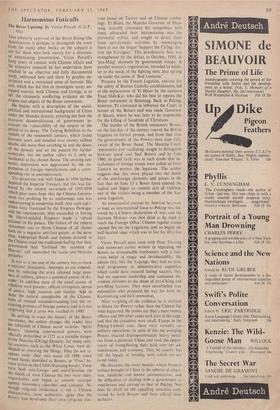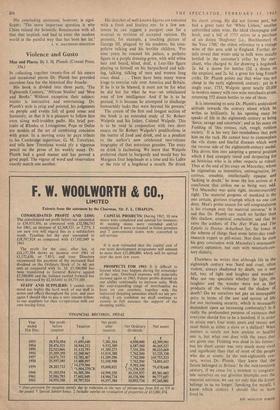Harmonious Fisticuffs
The Boxer Uprising. By Victor Purcell. (C.U.P., 45s.) THIS scholarly appraisal of the Boxer Rising (the Americanism is perhaps to distinguish the work from the many other books on the subject) is not for those who look merely for a dramatic or entertaining presentation. Victor Purcell's forty years of contact with Chinese affairs and the extensive research he has undertaken have resulted in• an objective and fully documented study, enlivened here and there by graphic de- scription and a restrained sense of humour. His aim, which has Ied him to investigate many un- tapped sources, both Chinese and foreign, is to sift the extremely conflicting evidence on the origins and objects of the Boxer movement. He begins with a description of the social, political and international background of China under the Manchu dynasty, pointing out how the excessive decentralisation of government in- creased the vulnerability of the empire in the period of its decay. The Taiping Rebellion in the middle of the nineteenth century, which lasted fourteen years and entailed over twenty million deaths, did more than anything to seal the doom of the dynasty and set the pattern for further outbreaks, but the author refers to it only as incidental to his chosen theme. The ensuing eco- nomic depression was aggravated by the im- Portation of foreign manufactures and a corre- sponding rise in unemployment.
The disastrous war with Japan in 1894 further depleted the Imperial Treasury, but this was fol- lowed by the reform movement of 1895-1898 Which gave some hope that the Chinese Govern. ment was profiting by its misfortunes and was endeavouring to modernise itself. Any such asp:r- ations were frustrated by the Empress Dowager and the reactionaries, who succeeded in having the liberal-minded Emperor made a virtual Prisoner in his palace. The failure of the reform movement was to throw Chinese of all classeS back on a negative anti-fore'gnism; at the same time, widespread floods and famine aroused in the Chinese mind the traditional feeling that their government had 'forfeited the mandate of Heaven,' and intensified the latent anti-Manchu prejudice It was as if the end of the century was to mark a national climacteric. Attempts to cut expendi- ture by reducing the army released large num- bers of soldiers, always a potential source of dis- order.. In addition most of the usual causes of rebellion were present: official corruption, denial of justice, high taxation and famine. Add to these the natural xenophobia of the .Chinese, horn of mutual misunderstanding and the in- creasing pressure of foreign powers. and it is not surprising that a crisis was reached in 1900: In seeking to trace the history of the Boxer movement, the author plunges the reader into the labyrinth of Chinese secret societies. 'Spirit Boxers,' claiming supernatural powers, were officially proscribed in 1727 as a possible danger to the Manchu (Ch'ing) Dynasty, for many simi- lar societies; such as the White Lotus, were de- dicated to restoring the Mings. They do not re- appear under their own name till 1898, when armed bands identified as Boxers, or 'Fists.' be- came active on the Chihli-Shantung border. These were both anti-foreign and anti-Christian (in the minds of most Chinese the two were indis- tinguishable) and began to commit outrages against missionary churches and converts. Al- though religious intolerance is not a Chinese characteristic, most authorities agree that the Boxers had developed their own religious doe- trine based on Taoism and on Chinese mytho- logy. Yi Hsien, the Manchu Governor of Shan- tung, scarcely concealed his sympathies with them, advocated their incorporation into the provincial militia, and sought to divert them from anti-dynastic' activities by encouraging them to use the slogan 'Support the Ch'ing; des- troy the Foreigner.' This pro-dynastic bias was strengthened by the defeat, in October, 1899, of `pro-Ming' elements by 'government troops. A parallel women's organisation, intended to minis- ter to the needs of the fighting men, also sprang up under the name of 'Red Lanterns.'
Pressure by the French Legation, anxious for the safety of Roman Catholic establishments, led to the replacement of Yi Hsien by the cautious Yuan Shih-Kai, who did his best to repress the Boxer movement in Shantung. Back in Peking, however, Yi continued to influence the Court in favour of the Boxers and was made Governor of Shansi, where he was later to be responsible for the killing of hundreds of Christians.
The murder of the British missionary Brooks on the last day of the century roused the British Legation to formal protest, and from that time the governments of the Powers were kept fully aware of the Boxer threat. The Manchu Court. opportunist and vacillating, sought to distinguish between 'good' and 'bad' Boxers, and by June 1900, its good faith was in such doubt that de- tachments of foreign troops were called up from Tientsin to protect the legations. The author suggests that this move played into the hands of the anti-foreign elements, and points to the fact that on June 13 a Boxer force entered the capital and began to commit acts of violence, one of the victims being a member of the Jap- anese Legation.
An unsuccessful attempt by Admiral Seymour to lead an international force to Peking was fol- lowed by a Chinese declaration of war, and the German Minister was- shot dead as he tried to reach the Foreign Office. Chinese regular troops opened fire on the Legations, and sb began the half-hearted siege which was to last for fifty-live days.
Victor Purcell joins issue with Peter Fleming and numerous earlier writers in regarding the - Boxers as irresponsible freebooters with a ludi- crous belief in magic and invulnerability. He admits that, like the Taipings, they had no poli- tical programme or administrative capability which could have ensured lasting success; they had no supreme leadership and contained dis- cordant elements in the shape of pro-Ch'ing and pro-Ming factions. They were nevertheless true nationalists who prepared the way for both the Kuomintang and the Communists.
After weighing all the evidence hc is inclined to blame the Powers rather than the Chinese for what happened. He points out that a mere twenty officers and 389 other ranks took part in the siege. and that the casualties were small. Except in the Peking-Tientsin area, there were virtually no military operations. In spite of this the avenging Powers exacted disproportionately heavy penal- ties from a prostrate China .and took the oppor- tunity of strengthening their hdld over her ad- ministration and economy. This, he asserts, has left the legacy of hostility with which we are faced today.
He discounts the many benefits which Western contact brought to China in the spheres of educa- tion, medicine and honest administration, and the difficulties of dealing with a government as treacherous and corrupt as that of Peking. Nor does he dwell on the appalling atrocities com- mitted by both BMers and their official sym- pathisers.
His concluding statement, however, is signi- ficant: 'The more important question is why China missed the Scientific Renaissance with all that that implied, and had to enter the modern world in the painful way that has been her lot.'
J. V. DAVIDSON-HOUSTON



































 Previous page
Previous page